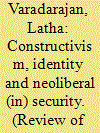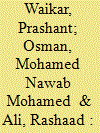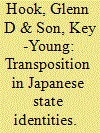| Srl | Item |
| 1 |
ID:
053670


|
|
|
| 2 |
ID:
177676


|
|
|
|
|
| Summary/Abstract |
This paper analyses the role of Islam in Malaysian foreign relations under the Premiership of Najib Razak. While most observers acknowledge the importance of Islam to Malaysian foreign policy making under Prime Ministers Mahathir Mohamad (1981 to 2003) and Abdullah Badawi (2004 to 2008), they tend to underplay its significance in Najib’s tenure as leader of Malaysia. Departing from this, we suggest that Islam was significant in Najib’s foreign policy in three ways. First, Najib utilized regional and international conflicts involving Muslims, particularly the Rohingyas and Palestinians, in order to construct Malaysia as a guardian of disenfranchised Muslims. Second, Najib relied on the notion of wasattiyah (the middle way) in order to buttress Malaysia’s image as a moderate Muslim country. Finally, Najib rationalized Malaysia’s alignment with Saudi Arabia in the Saudi-Iran geopolitical rivalry in religio-political terms. To make these arguments, we utilize a state identities approach to studying foreign policy. We unpack the notion of Muslim state identity into three manifestations: the activist Muslim state, the moderate Muslim state, and the Sunni Muslim state. The paper draws on both primary and secondary sources. We conclude with the conceptual implications of our argument.
|
|
|
|
|
|
|
|
|
|
|
|
|
|
|
|
| 3 |
ID:
119067


|
|
|
|
|
| Publication |
2013.
|
| Summary/Abstract |
This article aims to illustrate the trajectory of Japan's security identity transposition. As one of the catalysts in identity transposition, it focuses on the constitutive roles of norms regulating Japan's overseas dispatches of the Self-Defense Forces (SDF). Whilst keeping the identities of 'a peace state' and 'a civilian power', the authors argue that Japan has crafted a new security identity after the end of the cold war and the 9/11 terrorist attacks-namely, 'an international humanitarian power'. As evidence of this transposition, the authors illustrate a dramatic increase in the number of overseas SDF dispatches on humanitarian missions, and the shift of domestic and foreign responses to it. The authors note that Japan has been on the road to remilitarisation and internationalisation during the past four decades through the enactments of laws for overseas SDF dispatches, the general public's shift of attitude on the SDF's roles, the evolution of the alliance in a more operational direction, and the creation of threats from North Korea and China. Lastly, the authors argue that there is still a long way to go before Japan emerges as a normal state because of the presence of many domestic and structural barriers, especially multiple identities defining the Japanese state.
|
|
|
|
|
|
|
|
|
|
|
|
|
|
|
|